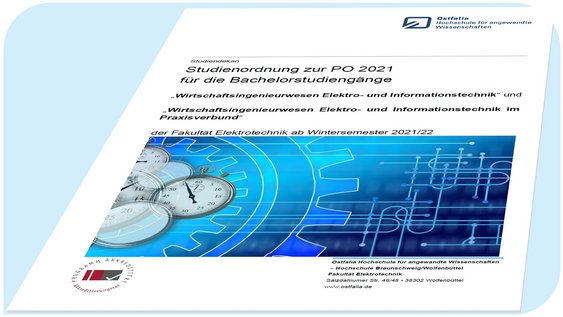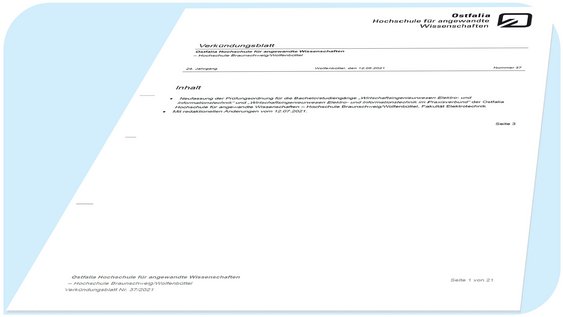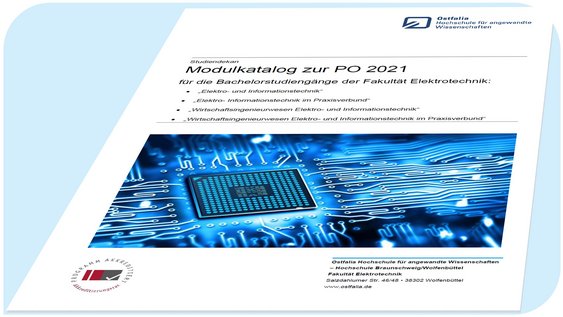Electrical Engineering, Business Administration and Economics
Do you want to cleverly combine technology and business?
On the Electrical Engineering and Information Technology degree programme, you will learn everything that is important for future topics such as electric cars, renewable energies and smart homes. Around two thirds of the degree programme provides you with sound technical skills. In the remaining third, you will acquire commercial knowledge in topics such as marketing, controlling or business law.
You benefit from a high degree of flexibility thanks to many online lectures, especially in the business part of the programme.
Also discover our related degree programmes:
Electrical Engineering and Information Technology – Bachelor's degree programme
Electrical Engineering and Information Technology – Dual Programme – Bachelor's degree programme
Electrical Engineering, Business Administration and Economics – Dual Programme – Bachelor's degree programme
Facts at a glance
Apply now!
Secure your place at the Faculty of Electrical Engineering and Information Technology!
To the applicationDetails of the degree programme
Fields of activity
With your Bachelor of Engineering (B. Eng.) degree, you have excellent career and salary prospects. Your areas of work are exciting and varied:
- Hardware and software development
- System and plant development
- Product development
- Research and development
- Project planning and management
- Technical sales
- Consultancy
- and much more.
in various industries, such as the
- Automotive industry and railway technology
- Aerospace
- Power generation and supply
- Information and communication technology
- Measurement and automation technology
- Medical technology
- Robotics
- Autonomous systems
Programme content
In the foundation and main degree programmes, you will take modules from two areas:
Technical area (approx. 2/3 of the course content)
- Digital technology
- Electrical measurement technology
- Electrical engineering
- Engineering mathematics
- Computer engineering
- Network technologies
- Control engineering
Commercial area (approx. 1/3 of the course content):
- Cost and revenue accounting
- Accounting
- Controlling
- Marketing
- Human resources
- Logistics
- Investment
- Business Law
Practical learning
With us, you don't just learn theory,
...but also apply it in real or realistic scenarios.
Direct application: Use laboratory experiments and simulations to experience and implement theories in practice.
Problem-orientated learning: Develop your problem-solving skills through exciting project work.
Insights into the professional world: Gain valuable experience through internships in cooperation with leading companies.
Develop key competences: Strengthen your problem-solving and decision-making skills as well as your communication and teamwork skills.
Market relevance: Prepare yourself optimally for your professional future by learning about the real challenges of your career today.
After the Bachelor
Study plan
1–3 semester Compulsory modules for basic studies (86.5 ETC) (1. – 3. Semester) Technical part (approx. 2/3 of the course content)
- Electrical engineering
- Computer engineering
- Engineering mathematics
- Digital technology
- Electrical measurement technology
- Electronic components and circuits
Commercial part (approx. 1/3 of the course content)
- Introduction to ABWL
- Marketing and empirical social research
- Human resources management
- Accounting
- Cost and revenue accounting
- Business law 1
Compulsory elective modules Key qualifications (1. – 3. Semester) - Working in a team
- Business English
- International Summer University
- Learning and working techniques
- Presentation of technical contexts
- Quality management basics
- Rhetoric and argumentation
- Technical foreign language
- Technical English 1
- Technical English 2
- Negotiation techniques
Compulsory modules for basic studies (86.5 ETC) (1. – 3. Semester) Technical part (approx. 2/3 of the course content)
- Electrical engineering
- Computer engineering
- Engineering mathematics
- Digital technology
- Electrical measurement technology
- Electronic components and circuits
Commercial part (approx. 1/3 of the course content)
- Introduction to ABWL
- Marketing and empirical social research
- Human resources management
- Accounting
- Cost and revenue accounting
- Business law 1
Technical part (approx. 2/3 of the course content)
- Electrical engineering
- Computer engineering
- Engineering mathematics
- Digital technology
- Electrical measurement technology
- Electronic components and circuits
Commercial part (approx. 1/3 of the course content)
- Introduction to ABWL
- Marketing and empirical social research
- Human resources management
- Accounting
- Cost and revenue accounting
- Business law 1
Compulsory elective modules Key qualifications (1. – 3. Semester) - Working in a team
- Business English
- International Summer University
- Learning and working techniques
- Presentation of technical contexts
- Quality management basics
- Rhetoric and argumentation
- Technical foreign language
- Technical English 1
- Technical English 2
- Negotiation techniques
- Working in a team
- Business English
- International Summer University
- Learning and working techniques
- Presentation of technical contexts
- Quality management basics
- Rhetoric and argumentation
- Technical foreign language
- Technical English 1
- Technical English 2
- Negotiation techniques
Why study Electrical Engineering and Information Technology?
- 1
-
Ideal combination
You combine technical expertise with business know-how and are therefore ideally prepared for management and interface tasks.
- 2
-
Diverse career opportunities
You will be in demand in numerous sectors - from the energy industry and the automotive industry to IT and consulting. You can play an active role in the design and improvement of modern technologies and help shape our technological future.
- 3
-
Shaper of the future
You work on innovative solutions for current challenges, such as digitalisation, renewable energies, smart mobility or Industry 4.0
- 4
-
Practical relevance and flexibility
Modern laboratories, student work with leading companies from the region and online modules ensure varied and flexible learning.
- 5
-
Can be used internationally
With your knowledge, you are in demand internationally and can take on exciting projects or tasks worldwide.
Useful links and files
Do you still have questions?
Our Central Student Advisory Service (ZSB) will be happy to support you.
Address
Building Am Exer 45, Room 101 -105
availability by phone:
Monday, Tuesday and Wednesday: 9:00 AM - 3:30 PM
Thursday: 1:00 PM - 3:30 PM
Friday and before holidays: 9:00 AM - 12:00 PM





